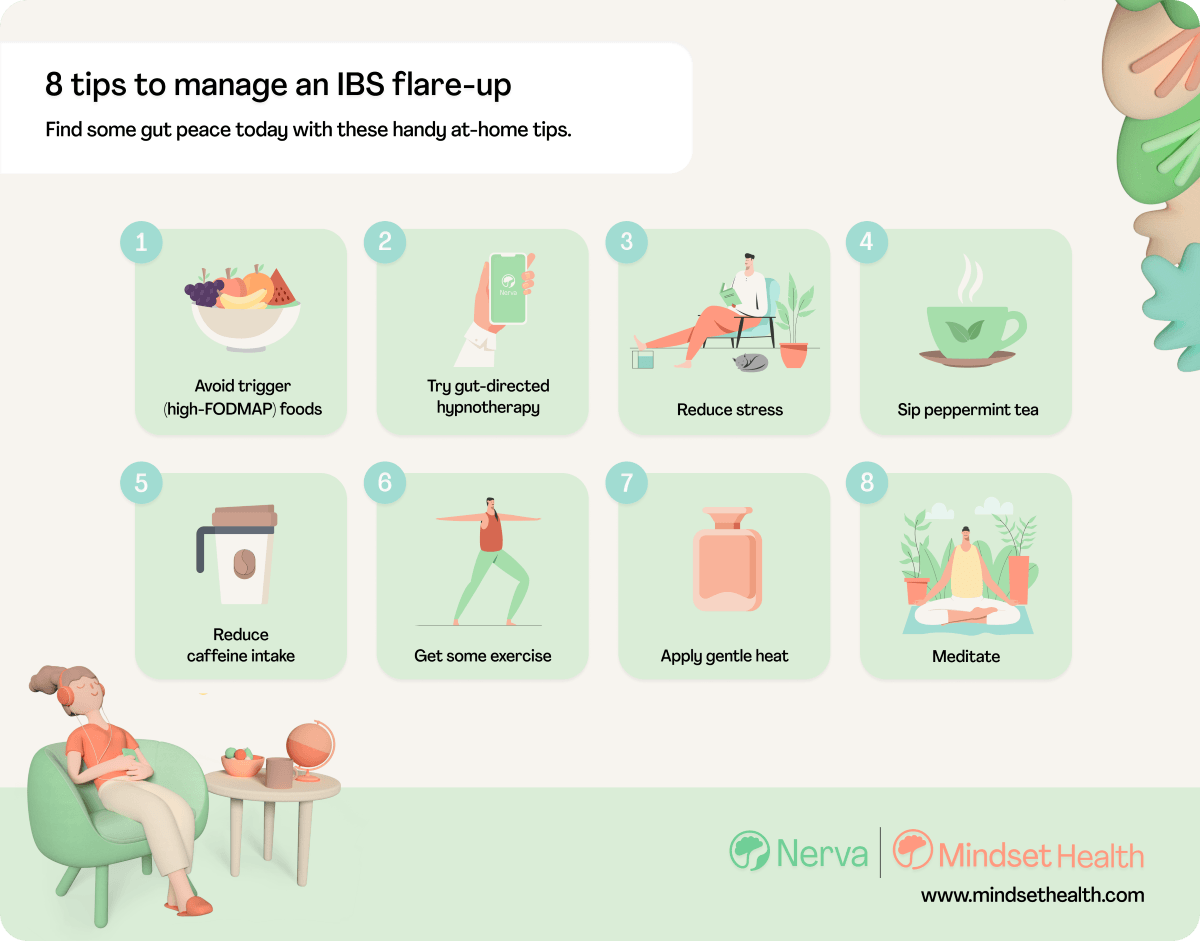Living with Irritable Bowel Syndrome (IBS) can be challenging, especially when it comes to managing symptoms. One of the most common symptoms that IBS patients face is a flare-up, which can cause discomfort, bloating, and pain. However, there are several foods that you can eat to help calm IBS flare-ups.
Understanding Pain Points Related to Foods to Calm IBS Flare Up
IBS patients often experience discomfort and pain during flare-ups, which can make it difficult to perform everyday activities. Additionally, IBS flare-ups can cause patients to feel self-conscious and avoid social situations. The unpredictability of flare-ups can also make it challenging to plan activities and maintain a healthy lifestyle.
Foods to Calm IBS Flare Up
The good news is that there are many foods that can help calm IBS flare-ups. These foods include bananas, rice, applesauce, toast, yogurt, and peppermint tea. These foods are known as the BRAT diet and can help soothe the digestive system, reduce inflammation, and ease discomfort. Additionally, it is essential to avoid trigger foods such as caffeine, spicy foods, and high-fiber foods during a flare-up.
Summary
In summary, managing IBS flare-ups can be challenging, but there are several foods that you can eat to help ease discomfort and pain. Implementing the BRAT diet can help soothe the digestive system during flare-ups, while avoiding trigger foods is also essential.
My Personal Experience with Foods to Calm IBS Flare Up
As someone who suffers from IBS, I have found that the BRAT diet is incredibly helpful during flare-ups. I often eat bananas, rice, applesauce, and toast, which helps to relieve my symptoms. Additionally, I find that peppermint tea is incredibly soothing and helps reduce inflammation in my digestive system.

It is essential to listen to your body and figure out which foods work best for you. Keeping a food journal can also be helpful in identifying trigger foods and avoiding them during flare-ups.
The Importance of Probiotics
Probiotics are beneficial bacteria that help maintain a healthy gut microbiome, which is essential in managing IBS symptoms. Foods that are high in probiotics include yogurt, kefir, sauerkraut, and kimchi. Probiotics can help reduce inflammation and improve digestion, which can lead to fewer flare-ups.

It is important to remember that not all probiotics are created equal, so it is essential to do your research and choose high-quality probiotic supplements or foods.
The Benefits of Fiber
Fiber is an essential nutrient that helps regulate bowel movements and improve digestion. However, high-fiber foods can also trigger IBS symptoms during a flare-up. It is important to incorporate fiber gradually and choose low-FODMAP options such as carrots, cucumbers, and zucchini. Additionally, it is essential to drink plenty of water to help fiber move through your digestive system.

My Favorite Foods to Calm IBS Flare Up
My go-to foods during a flare-up include banana pancakes made with oat flour, rice noodles with chicken and carrots, and yogurt with fresh berries. I find that incorporating low-FODMAP options while still allowing myself to enjoy delicious meals helps to maintain a healthy lifestyle while managing my symptoms.

Questions and Answers about Foods to Calm IBS Flare Up
Q: Can the BRAT diet be followed long-term?
A: While the BRAT diet can be helpful during flare-ups, it is not a well-rounded diet and should not be followed long-term. It is essential to incorporate a variety of foods into your diet to ensure that you are getting all the necessary nutrients.
Q: Can high-fiber foods be beneficial during non-flare-up periods?
A: Yes, high-fiber foods are essential for maintaining a healthy digestive system. It is important to incorporate them gradually and choose low-FODMAP options.
Q: Can probiotics be harmful?
A: While probiotics are generally safe, they can cause discomfort and gas in some individuals. It is essential to start with a low dose and work your way up to avoid any adverse effects.
Q: Can trigger foods be reintroduced after symptom relief?
A: It is possible to reintroduce trigger foods back into your diet after symptom relief, but it is essential to do so gradually and in small portions. Keeping a food journal can also be helpful in identifying trigger foods.
Conclusion of Foods to Calm IBS Flare Up
Managing IBS flare-ups can be challenging, but incorporating foods that are soothing to the digestive system can help reduce discomfort and pain. The BRAT diet, probiotics, and low-FODMAP options are all beneficial in managing IBS symptoms. It is important to listen to your body and figure out which foods work best for you, as everyone's digestive system is unique.
Related Images
How To Settle Ibs Diarrhea - HealthyGutClub.com

Pin On Food

Pin On IBS Advice

How To Calm IBS Flare Up In 4 Steps | The IBS & Gut Health Clinic

Foods To Calm Ibs Flare Up - Let Steady
